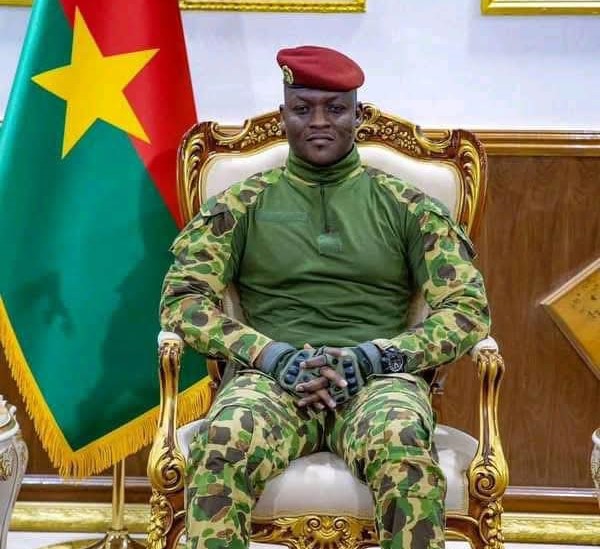At just 37 years old, President Ibrahim Traoré of Burkina Faso is proving that leadership isn’t about age — it’s about courage, vision, and standing tall in the face of history.
In a world where many leaders tread carefully, Traoré has taken a bold and unconventional path since coming to power in 2022. Two years into his presidency, his sweeping reforms are touching every corner of Burkinabe life — from how gold is refined to what students wear in school, and even the language spoken in government.
But beyond the headlines, what truly stands out is how deeply Traoré’s leadership resonates with ordinary citizens. In neighborhoods across Burkina Faso, it’s not uncommon to hear his name spoken with admiration — or to see people voluntarily guarding roundabouts at night to protect the man they believe is leading them into a new era.
A leader who looks inward first
One of Traoré’s most powerful messages is simple: “We must believe in ourselves.” And he’s walking that talk.
In 2024, he launched Burkina Faso’s first gold refinery, allowing the country to process its own precious metals instead of shipping them abroad. It was more than just a business move — it was about reclaiming dignity. He also nationalized key gold mines, saving the country millions and ensuring the wealth stays with the people.
ALSO READ Burkina Faso: President Traore’s 2-year scorecard on agriculture and beyond
ALSO READ [VIDEO] A revolutionary urban development project, Traoré City unveiled in Burkina Faso
ALSO READ Burkina Faso: Captain Traoré unveils 55 new modern hospitals
ALSO READ Burkina Faso’s President Traoré rejects Saudi offer to build 200 mosques
Then there’s the creation of Burkina Faso’s Postal Bank, a financial institution designed to serve citizens and reduce dependence on the CFA franc — a currency many see as a relic of colonialism.
And when it comes to food, the country now boasts its first tomato processing factory in Bobo-Dioulasso, funded entirely by Burkinabes. It produces 100 tonnes daily and has created thousands of jobs. For the first time, Burkina Faso is producing its own tomato concentrate, becoming the first former French colony in sub-Saharan Africa to do so.
From boardrooms to classrooms, culture is taking the lead
Under Traoré’s leadership, cultural pride has taken center stage. Schoolchildren now wear uniforms made from Faso Dan Fani, a handwoven traditional fabric. Courtrooms no longer require lawyers to don European wigs and robes — instead, they wear proudly African attire.
Secondhand clothing imports have been banned, and local textile industries are thriving. A new factory now makes uniforms for the police and army — all locally.
And in a historic move, French is no longer an official language in Burkina Faso. Instead, local languages have taken their rightful place in government communication — a symbolic but powerful departure from colonial influence.
Health, agriculture, and hope
On the ground, Traoré’s reforms are tangible. Farmers have received tractors, fertilizer, and modern tools to boost productivity. Mobile clinics and improved medical equipment have reached remote areas. Thousands of free cataract surgeries have restored sight to citizens who had long lost hope.
Meanwhile, salaries for civil servants have been increased by 50%, and pensions are being paid on time — a rarity in the region.
A new alliance and a new passport
Regionally, Traoré is forging new paths. Alongside Mali and Niger, he helped launch the Alliance of Sahel States (AES) — a bloc meant to strengthen cooperation and reduce reliance on the West.
In a symbolic shift, Burkina Faso also unveiled a new biometric passport without the ECOWAS logo, signaling a turn toward sovereignty and self-definition.
And in a surprising diplomatic twist, Traoré oversaw the return of the Russian Embassy to Ouagadougou after 31 years — part of a broader pivot toward new global partnerships.
What’s next?
Of course, not everyone agrees with his methods. Critics worry about isolationism or instability. But for many Burkinabes, Traoré has sparked something rare: belief.
Belief that Africa can build for itself. That dignity doesn’t need to be borrowed. That leadership can be young, fearless, and rooted in the people.
As Workers Day 2025 rolls in, it’s clear that Ibrahim Traoré’s story is more than just a political journey — it’s a movement. And in Burkina Faso, the people are not just watching it happen; they’re living it.
Abdallah is Editor-in-Chief of ASHENEWS and can be reached at www.elkurebe@gmail.com


